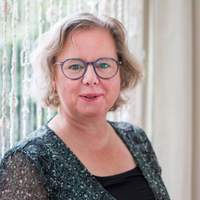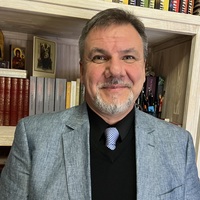
Neil Holm
Related Authors
George drazenovich
Lakehead University
Richard Topping
Vancouver School of Theology
Martin Fárek
Technical University of Liberec
Cass Fisher
University of South Florida
Stanley N Helton
Alberta Bible College
Ingeborg te Loo
International Baptist Theological Study Centre Amsterdam
Doru Costache
Sydney College of Divinity
Lauren Smelser White
Lipscomb University
Lasse T Lindgren
University of Helsinki
InterestsView All (22)









Uploads
Papers by Neil Holm
Many critics assert that “Descent into Hell” was one of his best novels. However, it is an obscure book dense with references to Dante and classical allusions. I found it hard to penetrate. However, it is worth the effort. I offer this summary as my interpretation of the novel.
The page numbers referred to in the text are from Charles Williams. Descent Into Hell. Endymion Press. Kindle Edition.
John Dirkx. a leading theorist in transformative learning. has focused on "soul" as a central construct. Rosemary Ruether engaged the discussion of "soul making" from a theological perspective and, while she did not use the term "transformative learning," she described soul making as "transformative metanoia," which she elaborates as a multi-dimensional transformation.
This essay joins a conversation with Dirkx and Reuther to examine four central constructs (experience, empathy, the desire to change, and soul) from a theological perspective in order to consider their implications for theological education.
today?' This paper argues that the theological curriculum at Finkenwalde
1. is revealed in Life Together and Discipleship
2. has an intended, although unstated, outcome
3. has an existentialist (rather than purely intellectualist) pedagogical emphasis
4. is relevant to theological education today
5. is particularly relevant to the Net Generation
Generation. I then consider the design of optimal conditions for learning by the Net Generation. I argue that learners bring
a range of natural, inherent, or native capacities to the learning environment but teachers are able to do little to enhance or
develop these native capacities. Learners also bring a range of previously learned capacities. They bring a range of attitudes,
proclivities, and sensibilities that teachers can encourage or discourage, enhance or diminish, or enliven or deaden. Part of the
art of teaching is to design learning activities that build on those sensibilities that lead to greater engagement by the learners
with an ultimate goal of releasing a learning process that leads to transformation and to transcendence. In developing this line
of thought, I draw on the work of Kalantzis and Cope, Robinson, and Zajonc who discussed learning conditions that
involved engaging students and creating opportunities for transformation and transcendence.
collaborate with God to complete creation. It is a process in which chaplains assist the personal awareness, growth, and understanding of the other person.
Keywords: chaplains, co-creation, embrace, presence, Walter Bruggemann, Martin Buber, Miroslav VoH.
Keywords: Bible, chaplaincy, common grace, minister, presence, 'the other',transcendence, trinity.
This article describes the disciplines of dispersion and community, reading Scripture, prayer, solitude, discernment, service and confession. Disconnected from contemporary Western life, they seem to bear little relationship to spiritual awareness pedagogy contemporary classrooms. The article considers some classroom processes akin to Joyce and Weil's Personal Family and Social Family models of teaching that contribute to spiritual awareness pedagogy that eventually enables children to embody these disciplines as Christians who take their call to discipleship seriously.
Key Words: formation, classroom, spiritual disciplines, Bonhoeffer, Life Together, spiritual awareness pedagogy. Personal Family and Social Family models of teaching.
Many critics assert that “Descent into Hell” was one of his best novels. However, it is an obscure book dense with references to Dante and classical allusions. I found it hard to penetrate. However, it is worth the effort. I offer this summary as my interpretation of the novel.
The page numbers referred to in the text are from Charles Williams. Descent Into Hell. Endymion Press. Kindle Edition.
John Dirkx. a leading theorist in transformative learning. has focused on "soul" as a central construct. Rosemary Ruether engaged the discussion of "soul making" from a theological perspective and, while she did not use the term "transformative learning," she described soul making as "transformative metanoia," which she elaborates as a multi-dimensional transformation.
This essay joins a conversation with Dirkx and Reuther to examine four central constructs (experience, empathy, the desire to change, and soul) from a theological perspective in order to consider their implications for theological education.
today?' This paper argues that the theological curriculum at Finkenwalde
1. is revealed in Life Together and Discipleship
2. has an intended, although unstated, outcome
3. has an existentialist (rather than purely intellectualist) pedagogical emphasis
4. is relevant to theological education today
5. is particularly relevant to the Net Generation
Generation. I then consider the design of optimal conditions for learning by the Net Generation. I argue that learners bring
a range of natural, inherent, or native capacities to the learning environment but teachers are able to do little to enhance or
develop these native capacities. Learners also bring a range of previously learned capacities. They bring a range of attitudes,
proclivities, and sensibilities that teachers can encourage or discourage, enhance or diminish, or enliven or deaden. Part of the
art of teaching is to design learning activities that build on those sensibilities that lead to greater engagement by the learners
with an ultimate goal of releasing a learning process that leads to transformation and to transcendence. In developing this line
of thought, I draw on the work of Kalantzis and Cope, Robinson, and Zajonc who discussed learning conditions that
involved engaging students and creating opportunities for transformation and transcendence.
collaborate with God to complete creation. It is a process in which chaplains assist the personal awareness, growth, and understanding of the other person.
Keywords: chaplains, co-creation, embrace, presence, Walter Bruggemann, Martin Buber, Miroslav VoH.
Keywords: Bible, chaplaincy, common grace, minister, presence, 'the other',transcendence, trinity.
This article describes the disciplines of dispersion and community, reading Scripture, prayer, solitude, discernment, service and confession. Disconnected from contemporary Western life, they seem to bear little relationship to spiritual awareness pedagogy contemporary classrooms. The article considers some classroom processes akin to Joyce and Weil's Personal Family and Social Family models of teaching that contribute to spiritual awareness pedagogy that eventually enables children to embody these disciplines as Christians who take their call to discipleship seriously.
Key Words: formation, classroom, spiritual disciplines, Bonhoeffer, Life Together, spiritual awareness pedagogy. Personal Family and Social Family models of teaching.